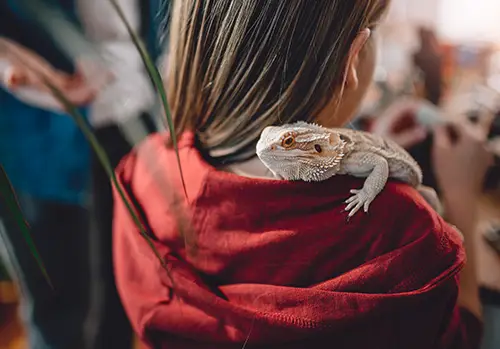
Photo by kerkezz on Adobe Stock.
Turtles and Frogs and Snakes, Oh My!
The popularity of reptiles and amphibians as pets has surged, especially for children, due to their low-maintenance nature and unique charm. And while these slimy creatures are fascinating companions, it may be best to avoid them.
This caution arises from the fact that reptiles and amphibians can harbor germs potentially harmful to humans, with salmonella bacteria being the most prevalent. The environment of these animals really allows the bacteria to thrive.
Transferring Bacteria
Salmonella, a bacteria commonly associated with foodborne illnesses, can also be present in the environments of reptiles and amphibians. These animals can carry the bacteria on their bodies, in their droppings, on food dishes, toys, and within their habitats. Interaction with any of these elements can lead to the transfer of salmonella. Therefore, making the ease of transmission is highly concerning.
Individuals, especially younger children, are at a heightened risk due to their natural curiosity to touch and explore their surroundings. When their hands come into contact with a reptile or its habitat, the risk of transferring salmonella to the hands becomes bigger. After contact, inadvertently touching the face, mouth, or nose allows the bacteria to enter the body, leading to an infection known as salmonellosis.
Salmonellosis
Typical indications of the infection include diarrhea, fever, and abdominal cramps. These symptoms typically manifest within a timeframe of six hours to four days after contracting the ailment and persist for about four to seven days.
While these symptoms can be manageable with at-home care, there are instances where you should seek immediate medical treatment. They are the following:
- Diarrhea and a fever above 102
- Continuous diarrhea for more than three days
- Bloody diarrhea
- Vomiting that prevents you from drinking liquids.
Moving Forward with Your Pets
If you already have one of these pets, there’s no need to stress. You do not need to consider getting rid of the animals. Instead, you want to mitigate the risks by ensuring that everyone in the household follows proper safety steps.
Keep Hands Washed. After handling the pet or its living area, the priority should be to wash your hands for at least 20 seconds with plenty of soap and warm water. A good tip for children is to sing the ABCs as they scrub and wash their hands. That will ensure the removal of any bacteria.
Clean Properly. Any cleaning materials used on your pet or their habitat should be reserved only for that purpose. It’s best practice to clean the cages, tanks, and other items outdoors and always avoid using a kitchen sink. You don’t want to risk the potential spread of germs to your cooking items and food.
Safe Play. Avoid kissing and snuggling with the pet, and keep your food and drinks away from the animal. More specifically, keep the pet out of the kitchen and eating areas.
Have Health Insurance Questions?
We hope that this information on salmonellosis from pets is helpful for you.
Insurance is oftentimes overwhelming and we want to shed light on the industry by answering your questions. Comment below and your question may be the topic of our next post!
If you liked this article, share it with your friends!
Empower Brokerage wants to help you find the insurance coverage you need and help you save money getting it. Stay on top of your health and give us a call at (844) 410-1320.
Get affordable health insurance quotes by clicking here.
See our other websites:

